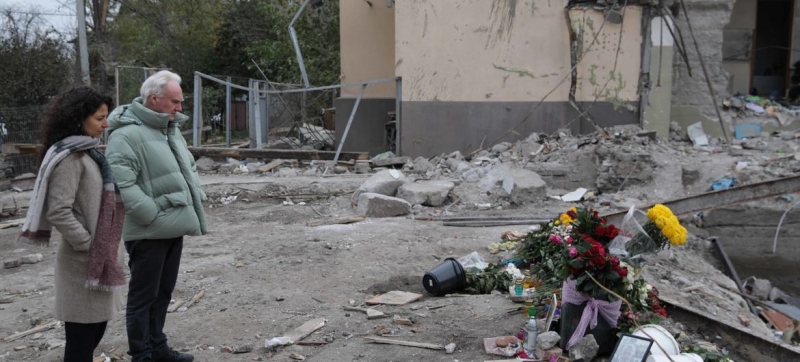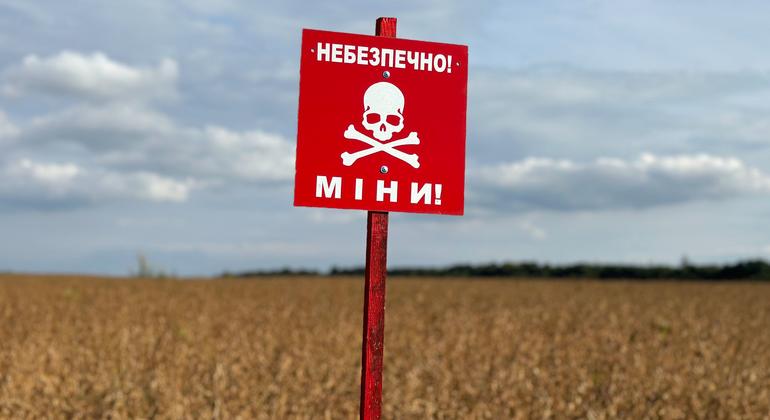
Matthias Schmale has visited many regions of Ukraine and was shocked by the scale of destruction and human casualties. Matthias Schmale on Ukraine: “Recovery begins as soon as the sirens die down” Peace and Security
Since taking up his duties as UN Humanitarian Coordinator, Matthias Schmale has seen first-hand the widespread devastation caused by Russia’s invasion of Ukraine. In an exclusive piece for UN News, Schmale shares his impressions of Ukraine and the UN system’s efforts to support the country’s people.
“I am constantly inspired by the strength and courage of the Ukrainian people. Having visited Kharkiv, Kherson, Nikolaev, Sumy, Zaporizhia and most recently Kramatorsk and Lyman, I have seen how the disruptions in electricity, water and heating have affected people.
I have spoken to people whose loved ones have died and whose homes have been destroyed. At transit points, I have met people who have had to leave their usual lives behind. Many of them have nothing left except a small bag with the things they managed to take with them. Every day they show extraordinary resilience – not only continuing to live, but also helping others.
The Ukrainian government and local authorities are doing an impressive job of helping people who want to return to their homes to do so as quickly as possible. One governor told me that after an attack that damaged 13 buildings, he and his partners were able to seal all the windows and reconnect water, electricity, and heat within four days so that people could return home.
I feel that this protracted war has led to widespread trauma and psychological suffering. The need for mental health support is clear, and it will take years to help people cope with the “invisible” effects of war.

However, I see people trying to start rebuilding as soon as possible, whether it’s their business, their home, or their life in general. Rebuilding begins as soon as the sirens stop. I’ve seen people return to their renovated homes or enter new ones with tears of relief. People don’t want to leave, they want to stay in their communities. And of course, every person I’ve spoken to wants the war to end, although many emphasize: not at the cost of territorial integrity.
Medium- and Long-Term Solutions
I want to reiterate the Secretary-General’s message about the need to ensure justice and peace in Ukraine, in accordance with the UN Charter, international law, and General Assembly resolutions.
The United Nations will continue to provide life-saving assistance. In parallel, we will seek medium- and long-term solutions that will help the affected people and communities recover and reduce their dependence on external assistance. I can only believe that our determination to support Ukrainians for as long as they need it gives them some hope for a decent future.
Needless to say, the disruption of essential services poses serious challenges to the country’s economy and development. The education and health systems are under enormous pressure, which is exacerbated by the growing mental health problems of the population.
Energy Crisis
The Russian Federation’s systematic and deliberate attacks on Ukraine’s energy infrastructure constitute a grave violation of international humanitarian law, causing predictable and widespread harm to civilians.
The United Nations Development Programme (UNDP) estimates that more than 60 percent of Ukraine’s energy infrastructure has been damaged since 2022. As winter approaches, there is an urgent need to address the worsening energy crisis and work together to support the people of Ukraine at this critical time. Restoring access to electricity is critical to ensuring the functioning of essential public services.
UN agencies are helping to clear rubble and mines, repair houses, schools and hospitals, build new social infrastructure, provide basic services, mental health and psychosocial care, and support livelihoods and employment – all of which are priorities for the government. The question is how to scale up efforts, as the needs are so great.
Ten Million Displaced
The war has displaced 10 million Ukrainians. Of these, 3.5 million have found shelter in settlements across the country. Many have lost their livelihoods; they need shelter, jobs, and functioning hospitals, schools and kindergartens.
Humanitarian agencies have established emergency response mechanisms to respond to changing and growing needs across the country. We have demonstrated flexibility and efficiency time and time again and will continue to do so.

Planning for the Future
During my meetings with leaders from different regions, I was impressed by their focus on planning for the future. They are preparing for long-term action while remaining flexible in dealing with the immediate, day-to-day problems caused by the ongoing war.
Of course, we must support continued contingency planning and help ensure that the humanitarian response continues. At the same time, important priorities such as mine clearance, housing for displaced persons, and veterans’ needs require a high level of coordination between UN agencies, the Ukrainian government, donors, and international NGOs.
As I saw during my visit to Izyum in the Kharkiv region, agriculture, which is vital to supporting local communities, faces additional risks due to the widespread presence of explosive remnants of war.
Farmers sow their fields to feed their families, fearing they will run over a mine or unexploded ordnance. The government, various NGOs and the UN are working together to pool their efforts to clear agricultural lands of mines and help farmers regain their livelihoods.
Another example is the installation of solar-powered pumps in wells in the Mykolaiv region, which reduces dependence on the electricity grid and is a harbinger of a “green” recovery. I have seen classrooms built in underground metro stations to continue in-person learning and mitigate the challenges of online education. These are all great examples that we need to support with whatever resources we have.”
Read also:
